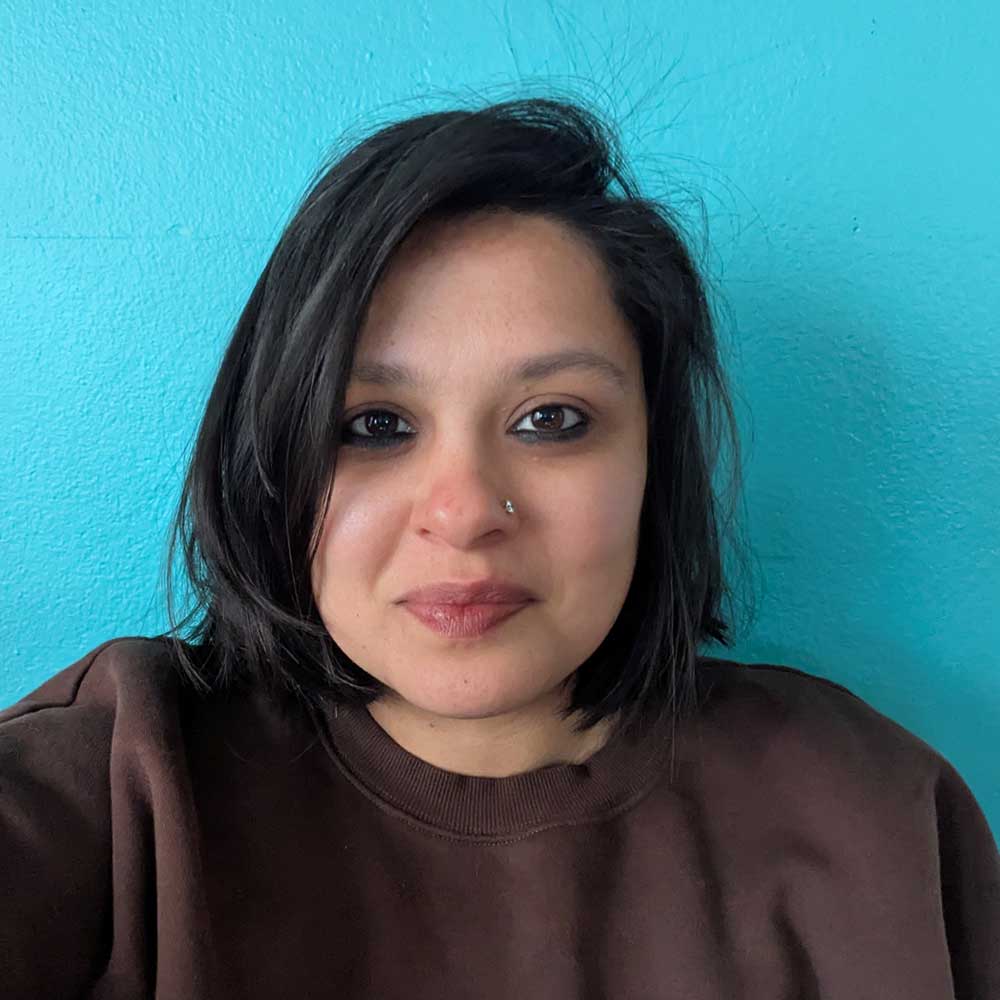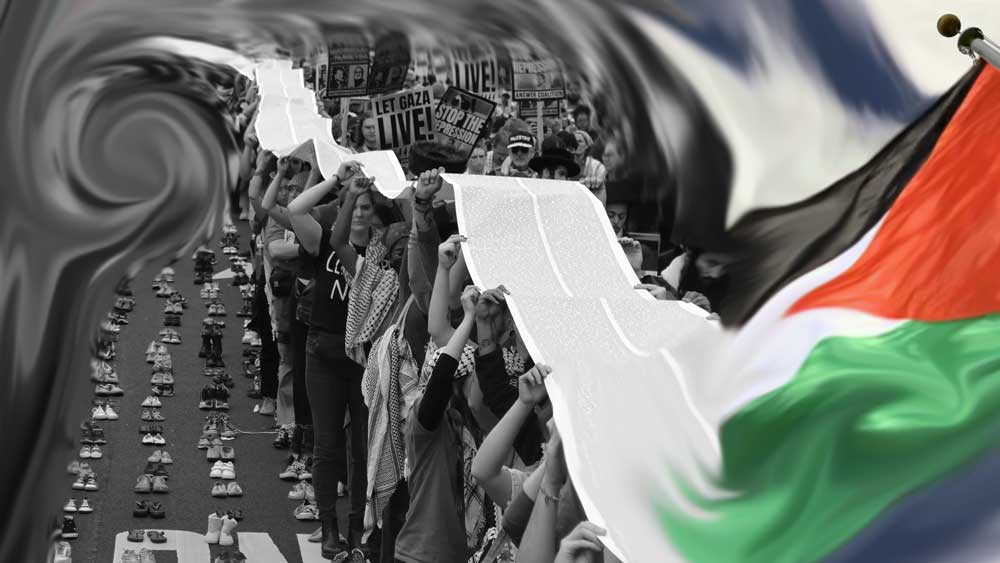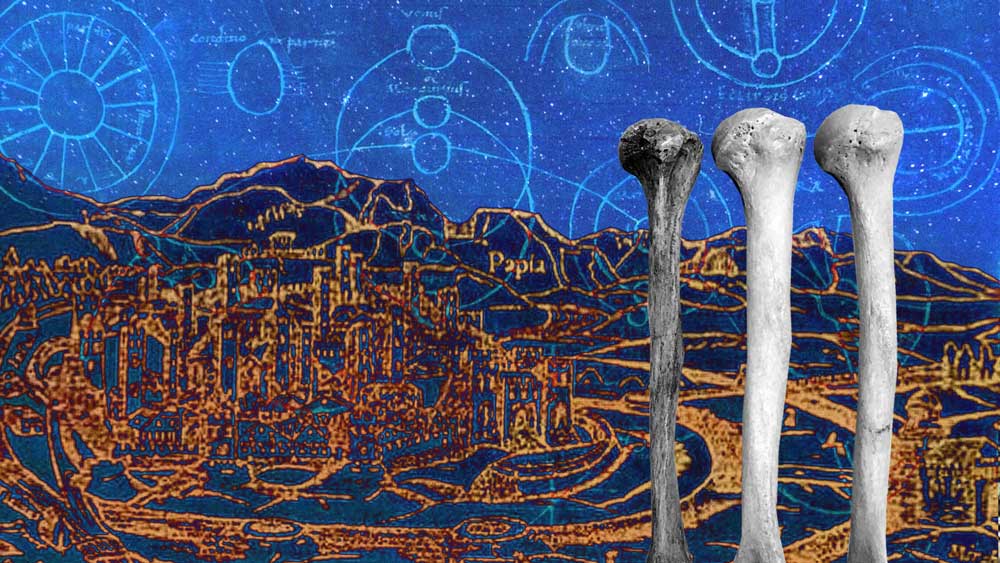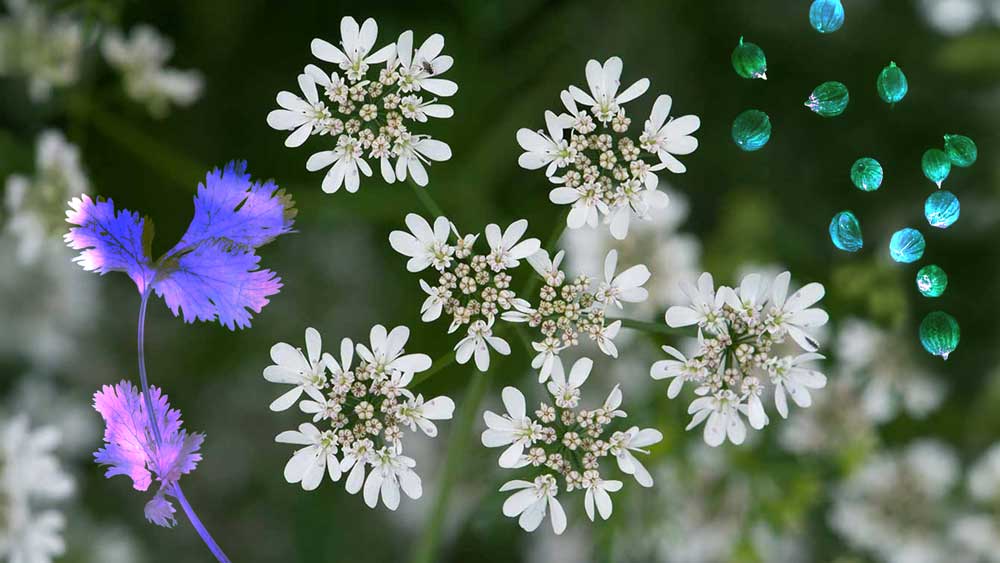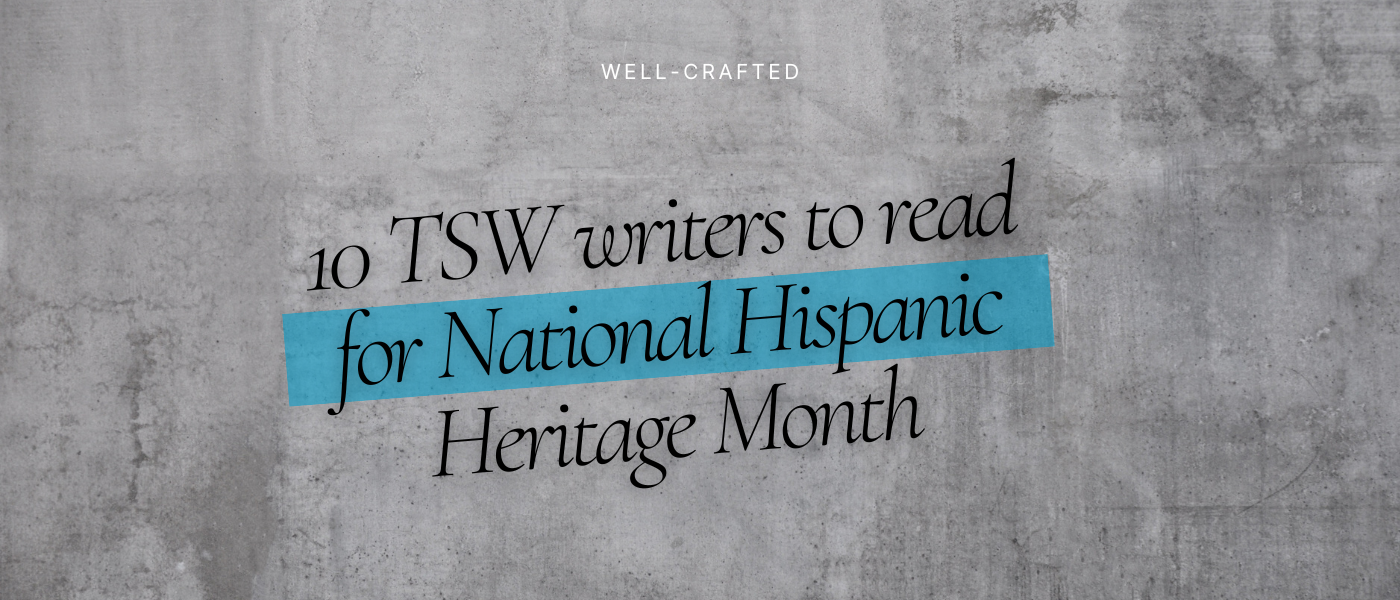October 2023 // A Flag and a Fist
After ten days of live-streamed genocide, queer students at the high school where I work take down the rainbow pride flag from where it has been flying over the courtyard for the past nine months. Hoist the Palestinian one in its place. Seamless, a mere five minutes to switch out one symbol of love for another, each a testament to freedom. Five minutes above a crowd of supporters who are Yemeni, Mexican, Filipino, Black, Polynesian, Guatemalan, queer, straight, transgender, cisgender, youth, adult, newcomer, citizen, American, immigrant. All of us here, hurt and angry. Using our voices because we have to; there is no other way.
It is mid-October, and from what I can calculate, an average of three hundred people have died each day during this siege on Gaza. Each day, three hundred people are killed, nearly half of them youth. Three hundred is the size of the freshman class at the high school. The psychic weight of an entire year’s rosters in the restorative justice course that I teach for ninth graders. An entire year of stamp sheets and Do Nows; phone calls home, grades and progress reports; parent-teacher conferences, final projects. An entire year of glittering insights, questions, and annoyances. An entire year of young, squirrely, curious life.
Last fall, we lost a student to gun violence. It wasn’t the first time this had happened, but it hurt. Something about her sincerity, the affection I didn’t realize I had for her until she was gone. Somehow, without knowing, I had ballooned a hope for her inside my heart, and when it popped, I felt the air leaving my body, without warning — a loud and senseless snatching of breath, unbearable. She was sixteen.
One student gone, murdered, disappeared from our community. Over four thousand in today’s count of the dead in Palestine. Disbelieving, powerless, we watch. Our political leaders supply the weapons, the warplanes, the money, the flimsy morality behind it all. We scream, we call our representatives, we organize walkouts and it continues it is happening before our eyes.
November 2023 // Red Beating Hearts
The flag soars above our courtyard for a full month, blooming under bright shivering against wet flapping a fire in our spirits, the smallest symbol of dissent, until a substitute teacher posts it on Twitter because he thinks: cool. Though students had been speaking out, hosting teach-ins, fundraising for displaced families, and even organizing a walkout in protest of the genocide, we adults are nervous about sharing any of it on social media. We are aware of the danger of Zionist backlash, how colleagues at Palestinian solidarity organizations have been doxxed, how yearslong, ongoing attempts have come close to completely removing all references to Palestine from our Ethnic Studies curriculum. The substitute teacher does not share this sensitivity or caution — and because he is a journalist with a large following, our private revolt suddenly becomes the world’s obsession, something for bots and patriots to fixate on, flooding our phone lines. The harassment we incur is swift, cold-blooded, and dissonant: How dare you lower the flag of your own country? You terrorists deserve to die! The front office staff are some of our lowest paid union comrades — a couple of them wear hijab, all are people of color from the neighborhood, and some even graduated here. They form the front line of our school, administering COVID tests, de-escalating confrontations with angry family members, lovingly telling youth who no longer attend here to leave, welcoming desperately needed last-minute substitute teachers, managing threats from ICE agents and suspicious strangers, reading body language and the possible presence of weapons, protecting us in more ways than we know. This Islamophobic vitriol is a new layer of stress over stress that they field with grace as it piles on, thick, a heavy coat that won’t come off even as the buttons slip, clinking to the ground in quiet puddles.
I swallow the sadness, learn its taste, the disappointment in hardly being allowed the chance to boast about our young scholars. Their courage, this act of resistance. How they exercised their right to political expression, demonstrating how they had absorbed the lessons of history, fulfilling promises of that infinitely bending arc: just, liberated, fierce.
The day after the social media post, we arrive on campus to see that the school district has removed the Palestinian flag. The next day, the US flag appears in its place, an unusual sight for many of us who have been accustomed to the colors of the Black Power movement in February and Latin American independence in September, perhaps not even remembering the last time the stars and stripes flew above us. Unremarkable except for its now-conspicuous presence, glaring oppressively at our backs as we walk, silenced, to our classrooms, the beginning of darkness creeping toward us, encircling our throats.
It will be several months before teachers and staff begin to receive notices from the legal department (only some of us, and not even the Arabs among us), the chill running through our ranks as we become disoriented, isolated from each other, our principled actions stripped of their dignity. The Muslim students ask for a meeting with the administrators. They understand the school cannot fly the Palestinian flag — not after the exposure that the social media post garnered, not now in this tense political climate, trauma-charged and filled with static. They accept this reality, but point out the insult of choosing to fly the national flag now, after years of not doing so, at a moment when the US is enthusiastically massacring their loved ones for all to see. As if it weren’t hard enough to tolerate the media gaslighting, this decision is an affront to racial justice, a humiliation. It is disrespectful. The administrators listen, eyes meeting eyes, pooling with compassion as their hands twist, sweaty, tied by district policy, by the death threats that have landed at their doorstep, by the lawsuits naming them personally responsible for a hostile, discriminatory, and anti-Semitic environment. I feel the impossible anguish from all sides, hearing from students and from colleagues, holding space for complexity through the prism of peacebuilding. My job is to facilitate restorative justice, and at times like these, the mirrors that reflect our shared humanity crack into shards, jagged, inside me.
Organized labor and community groups emphasize that we are out of compliance in how we fly the flag — and have been for years. It is absurd to suddenly be concerned about flag protocol when all this time we have violated federal regulations: allowing it to be rained on or flown under the shadow of night, without adequate staffing to follow the letter of the law. This is just another illegality that we live with in public education, they say, reassuring us that we have nothing to worry about. A few students hop the fence at night to remove the US flag, but it is replaced by the next morning. We are relieved to learn the students in question are not Arab, but Latino. They are suspended for a few days, their brazen act the softest solidarity-pillow where we can rest our wildly beating hearts.
Then the requests for investigation interviews come, slowly, weeks and months stretching between them: This letter is to inform you that the school district is investigating a complaint concerning an incident whereby the Palestinian flag was raised and to which you may be a witness . . . My colleagues and I ignore the messages until we realize our employment may be contingent upon cooperation, facing confusing questions seemingly fueled by information from an Internet that is completely out of touch with reality. Who participated? What about Mr. Goldstein, or Ms. Esquivel? (Nobody by those names exists here.) We have seen enough intimidation to know that free speech is a lie, but how far do we go to expose it? Do we risk our livelihoods?
Our labor representatives tell us to be honest while also conveying the conditions, the culture, how pervasive our protest is and was, indistinguishable from other anti-racist or pro-peoples’ activism that is lauded by equity initiatives. Short answers, don’t digress. Stay on topic, never revealing that your mind is splintering within itself, performing an impossible duality, disingenuous, as if the decomposing babies in the neonatal units in Gaza didn’t haunt you, feigning ignorance of the sexual violation of Palestinian prisoners. Contort yourself to do this, somehow, ensuring that the real work endures under the radar, a careful defiance: answering students’ questions, providing educational resources, supporting budding activists, sitting with them in despair, bringing kindness and safety to colleagues in panic, gritting teeth with a laser focus, alone and inaudible, together.
December 2023 // Rose and Rose
The holidays arrive and only a few days remain before vacation begins. In the break room, I watch the pages emerge from the printer as it spits them out two per second. Each page carries one name, a single life. Each page holds a million stories, wishes, hopes, and dreams. Whispering one one thousand as a rosary two two thousand in sacred remembrance three three thousand chanting four four thousand counting through the tears that well up five five thousand racing from the teacher’s lounge six six thousand to escape the sound of ink on white. The pulse of paper slit sheaf disc clean innocent beats in my temples as I breathe into the crisp winter air. Returning to the printer, the job has stalled and I understand I have exhausted my entire year’s supply of paper. Abandon the project, I think to myself. It is already too hefty, the stack a solid thud landing on my desk as students, bright-eyed and passionate, plan to put the sheets up in every hallway. The task is massive, endless, an anxious, voluminous despair sealing my lungs.
The organizers of the children’s action tell me we will be carrying as many of the posters as we can, a child is killed every ten minutes, and to take one home to place on my fridge, my altar, cherishing the memory and meaning of one in my family’s prayers. I take two and they are heavy, too much to bear and also not enough, the guilt a secondary weight.
Rose Tamer Mahmoud Al-Khayyat, 5 years old
Rose as in sweet, as in precious, as in the face of God. Scattered at the tomb of the Prophet, the divine dance of truth against atrocity.
People don’t live very long, I explain to my daughter. They don’t have enough medicine or wheelchairs or food or clean water. People get sick. That’s why most people in Gaza are young — there are more kids than we have here, shona. She is five. I don’t share the facts of forced displacement, withholding food and medicine as a tactic of ethnic cleansing, detention and torture without due process. Speaking calmly so as not to betray my anger, my disgust at how empire squeezes the riches from a people, a culture, their water and soil. I ask her to find all of the shoes that don’t fit her or are broken, let’s put them in a bag, okay? In total, we locate twelve pairs worn tough and loved well. The organizers will line them in rows one dozen in front of the children’s two dozen three museum of play dozen four dozen and discovery, where the war-mongering president fetes with world leaders in dazzling blindness to the horrors underway. We put the bag on the porch to be collected and joined with more than nine hundred pairs from the local families coalition.
First thoughts in the morning, last thoughts at night: How are they surviving, these children, their parents? What kind of brutal test is this? And when will it stop? The hours in between are a slow-moving trail of dread and pain, dragging molasses through dirt meeting the bright sunshine in the face of my toddler, my younger child, his sparkles floating hovering landing on my cheek in wet sloppy chumus. I look outside, dismayed at the contrast in my conditions, angry and grateful that we are safe, where we are safe, on stable ground, where motorized wheelchairs can rumble steadily by, where the disabled are few, the limbs of my neighbors and colleagues attached and functioning. The breakfast table abundant and the kitchen warm, water I drink from the sink in desperate gulps.
Rose Abdul Aziz Muhammad Al-Ghoul, <1 year old
The name of the second child whose placard I take home, just a baby, an infant, a bud of new life. Blue ash of skin between the rubble, a child’s body buried beneath concrete, these images are stitched beneath my eyelids, stuck. To unthread them would be a double tragedy. Loss and loss, Rose and Rose and thousands of petals on unmarked graves.
It clings to my ribcage, this fury tinged by grief. I don’t want it. I can’t shake it. I tighten my grip and from it, form my shield, armor against the sting of cruelty, the sanctioning of suffering, this denial of humanity.
January 2024 // Ululation the Weeping Defense
Ululate, intransitive verb: to howl or wail, as with grief from the
Latin ulula, meaning screech owl, or the high-pitched screams of
mothers in Gaza and the rest of us yelling, chanting, bellowing under
clouds of an October sky, November, December, January, our voices
thick with rage while words from our government collect like silty
gravel in our ears, twist like worms in our stomachs, pile like lead upon
our chests that push proudly out to meet each other when we gather, flash
mobs descending upon centers of capital shaking or crying our tears the
anchor that drops into the sea, lodging itself in the softest sand hearts of
struggle, of love, of protection. Ululation the weeping defense; we the
bodyguards against injustice.
February 2024 // If Not This Shared Skin of Struggle
after “Holy the Firm” by Annie Dillard
We scream into the air from the middle of the street, ten thousand heartbeats between the sidewalk and the opposite curb. It has been one hundred days of genocide. Most of the people here are strangers to me and yet they are sacred, intimate. A woman marches next to me, her voice a thick rope, strong and clear as it leaves her lungs: Free, free Palestine! Free, free Palestine! Moving block to city block, we pulse in unison, ten thousand throats scratching ten thousand cheeks wet with salt remembering this morning’s count of the dead, yesterday’s news of the trucks with humanitarian aid stalled at the border, last week’s hospital explosion, the swift passage of kill-laws and torture-memos, shadows and ghosts.
Biden Harris you can’t hide, we charge you with genocide! Our chants float above us, shouting, each droplet carrying the enormity of human saliva across the globe, within each particle the grief of the world hissing spitting stringing us together — the one shutting down highway 101 in San Francisco, the one whose palms hit the drums in Paris under threat of imprisonment, the one in the West Bank under the watch of Israeli military cameras, the one blocking the Brooklyn Bridge, the one breastfeeding while marching, the rhythm of her legs a comfort to the baby. I seep into a drop and mingle with the other drops as the wind carries me over oceans and deserts. I am sitting in the rubble, cement dust on my face, shivering and cold. I am in the halls of Congress, pushing the pages of my community’s signatures for a ceasefire into whoever’s hands will take them. I am holding a bullhorn as my classmates walk out of school in London. I am lighting a candle in Kolkata for a neighborhood vigil for Palestinian victims after the pujo celebrations. I am hoisting a flag with my hip as I straddle a light post in Washington DC, black green white red swagger and rebellion.
Our voices illuminate the sky, together forming a translucent mesh of silk each a thread of their homes, their mothers, their births, their families, their communities. The fabric of sound washes over my face and I feel the arms that cradle newborns, the fingers that type high school essays, the hands that wash dishes, the shoulders that carry backpacks, the eyelashes that flutter with pride in seeing their children walk through this world. The feisty teenager, the preschool teacher, the handyman, the restaurant worker, the journalist, the live streamer, the painter, the grandmother, the uncle, the scientist. All of us here thrusting ahead, feet and spines, unraveling spirits packed tight. We are intact, we are firm, we are the strength of granite.
Not another nickel, not another dime, no more money for Israel’s crimes! It is getting late. I shiver and peel off from the street to enter the train station, heading home. I can touch the cold of the others, each bump of raised flesh a flash of life and together, a song of power and love for the people. If not this shared skin of struggle, a mournful heart that sags deep also burning red-hot as you take your daughter to school, as you eat your breakfast in the stillness of your classroom before students arrive, as you wash the dirt from the day. Love that melts the pain through collective witnessing and speaking into the fog, steady and generous, massive and true.
March 2024 // Arms of the Earth Cut from Its Own Abundance
Approaching the spring equinox, already it is hot. I am sitting at a red light under the train tracks. It’s a short trip home from picking up the kids, but we’ve hit traffic. The sun beats through the untinted windows of our car. I am tired, my heart a bag of wet sand. I am hungry. It is Ramadan. I am not hungry as in fasting, not hungry like the children of Gaza, not like eating birdfeed and leaves, not famished from Israelis preventing the entry of food with their bodies, civilians at the border where trucks wait with aid packages, fruit, and medicine. Not hungry as in eating dirt from my family’s stories of the Bengal famine, the clay hardening in their stomachs, causing death layered atop death, manufactured starvation, the earth’s arms cut from its own abundance from giving of itself. And yet the pangs in my belly are there, small, bothersome, real.
Here, in the dry afternoon at the end of another work day, I am alone in my thoughts, swimming in the uncertainty of fallout from the flag incident, drowning in exhaustion from waiting for the tilt, the pivot, the breakthrough and pouring of peace into all of our cups. I begin to hear my children behind me, sputtering, small sparks of speech. The radio is off — there is no music, they are not fighting. In fact, they sound excited. I tilt the rearview mirror to see Ishaan, his neck thrusting as far as the carseat will let him, a mirror of his didi, who is also craning and watching in amazement as the arm of an excavator dips down beyond view, twists, and releases its contents into the back of a truck. Their eyes glitter from one movement to the next, enrapt.
Their words are fuzzy, lifting me from my numb and drowsy daze in pieces. I want to drive that thing!…But you can’t drive that thing cuz you’re not a grown up…But I like driving that thing, when can I drive that thing?…Maybe when you’re thirty.
I realize my daughter is actually a bit terrified of the excavator. Her voice comes stronger into focus as she directs her attention to me in the driver’s seat. “Ma, what would happen if it grabbed me?”
“It would hurt you, shonamoni, it’s not meant for grabbing people, just really hard stuff like houses and buildings.”
The light turns green and I drive away from the worksite, straining ever so slightly to determine whether the machine has “CAT” written on it — but I can’t identify the make. On this day twenty-one years ago, an American activist was killed in Gaza by a Caterpillar bulldozer manned by an Israeli army reservist while trying to protect Palestinian land and life. She was twenty-three. Standing in front of the bulldozer, blocking it from destroying a Palestinian pharmacist’s home, she was close enough to look the driver in the eye before it crushed her body, bones and skin and muscle and heart. Her parents have kept up her fight, refusing to drop the baton from her outstretched hand, righteous, free.
I see the vests of municipal employees and understand they are clearing an encampment, as they do every other week it seems, on this stretch of road that has become a tent city. Residents look on from the sidewalk, squinting against the midday sun as the construction trucks smash, scoop, and misplace their belongings. Looking on and waiting as the police lights flash, their vehicles blocking traffic. In a few hours, after the cops have run up a bill, generous — their pay, at our collective expense — they will return to salvage the scraps they can. Set up shelving to sell plants and flowers, cook meals on camp stoves, pull tarps and fabric and wooden beams for more shelter, each day with its new arrivals, the young and old, toddlers and grandmothers, solitary men. Dollars into destruction, our taxes, the machine of war thrumming bright, near, far. In a year, the governor will legitimize this rampage, labeling the encampments a hazard to public health. In the meantime, these people remain unhoused, their lives in greater disarray as the junk gets shuffled with more frequency. Vibrancy into asphalt, stains on our fingers.
The details slide like marbles in my brain, all of what I’ve learned in the past day, marking the twenty-first anniversary of the activist’s murder. I feel cranky, like I have been startled from sleep. A storm cloud spreads across my chest and I push on, bitter, hardening by the minute as time drags on without relief. I am touched by my children’s sweetness, their wonder at the world, their sheer joy in being alive. I’m troubled by how long it took me to notice what was happening in the back seat and in front of me, how deeply submerged I was, the profound and tragic cruelty that surrounds me, this global moment of pain.
Reaching the house, I walk with my daughter to the mercado on the corner to buy eggs and milk, sidestep trash, give space for an elder without adequate housing, smell the hot-oil pupusas our neighbor sells from her porch on Fridays. At the park, happy children coexist with malt liquor bottles, strewn blankets, and food wrappers in the play structure; strollers keeping the belongings of unhoused community members against the trees. From infancy to old age, the span of life in this place, all of us surviving.
That the creek trickles by, cutting through these city streets. That I can hear it, the water’s murmur, the rubber of our sneakers smudging the wooden boards of the footbridge, aches and whispers to sustain our weight.
That I am here to witness this. A telephone wire frames the horizon, birds before flight, each bird and each heart. The wind washes my face, enters my lungs. I am breathing even as I hear and hold new violence. The tips of my child’s fingers, throbbing and tingling into my own, this living and breathing and moving that is no guarantee, no right, not right, not fair. An ugly thing if it weren’t also precious, fearsome, and worthy of fighting for. This fight, theirs, ours.
1 Like me and my classified education coworkers on campus, Rachel Corrie was a proud rank-and-file member of Service Employees International Union (SEIU). After she was killed, her comrades fought for the union to divest from Caterpillar, nearly succeeding before Zionists from the Jewish Labor Committee interfered and blocked its passage at the California Executive Board, claiming anti-Semitism. An elegant slice of her life as an organizer with the International Solidarity Movement can be found here: “Rachel of Olympia, Rachel of Rafah” by Laura Kraftowitz (Protean Magazine).
